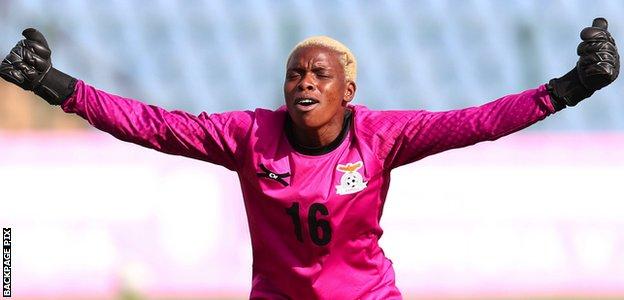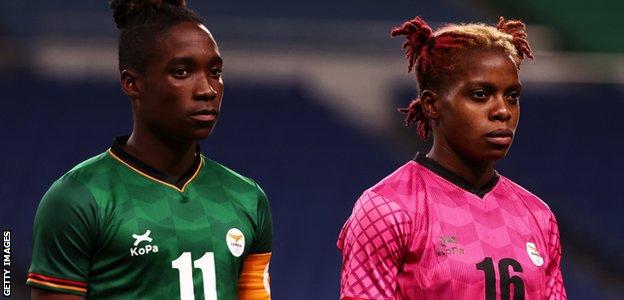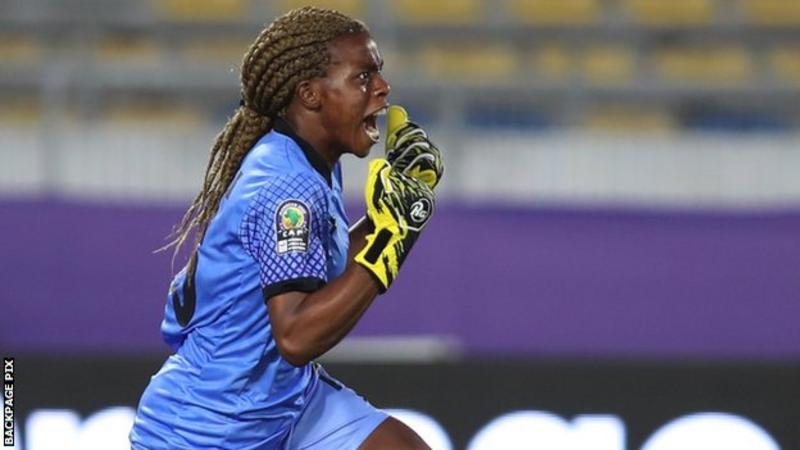As a child, Hazel Nali constantly got in trouble for playing football.
The goalkeeper was the hero last week as Zambia qualified for their first ever Women’s World Cup, with the 2023 tournament kicking off in Australia and New Zealand on 20 July.
But growing up she was at odds with her parents – who preferred her to focus on studying rather than football.
“I really had so much trouble that I had to change where I would stay,” Nali, 24, told BBC Sport Africa.
“I went for a holiday at my grandma’s place. And I really cried because I wanted to stay there and enjoy my sports career. So, I had to do that. And it really helped me a lot.”
Her late grandmother was not only her refuge but also her inspiration.
“She used to play netball, and in the process, I wanted to do something different from her sport. So, I began playing football and from that time, it has been my favourite sport,” Nali said.
“She would encourage me. She told me to focus on school but also play football because I like it. So, she understood me so well and it really gave me the zeal to keep on going.”
Nali’s persistence paid off.
Her football career started with Zambia’s Under-17 national team and now she plays professionally in Turkey, and her parents have finally come around.
“I think the moment I started being named in the national team, that’s the time my parents stood up for me and began supporting me. My mom is now my biggest fan,” Nali recalls.
From U17 World Cup to senior stage

Nali is one of the senior members of what is turning out to be Zambia women’s golden generation in football.
By qualifying for the World Cup for the first time, the team continues to break new ground in the sport after making their Olympic Games debut last year.
For Nali, these milestones are the continuation of a journey that started in 2014 with the country’s first ever global tournament, the U17 Women’s World Cup.
“I feel like that moment, that’s where everything began,” she explained.
“That’s the very year we also qualified for the Women’s Africa Cup of Nations for the first time. If you look at the team that qualified for the Women’s World Cup, half of it came from the U17 World Cup.
“I really want to experience more, because now it’s at a senior level. I’m very excited and looking forward to the World Cup.”
Plaudits from Mweene and influence of Banda
Zambia booked their place in Australia and New Zealand after reaching the semi-finals of this year’s Women’s Africa Cup of Nations (Wafcon), as the Copper Queens beat Senegal 4-2 on penalties after a 1-1 draw.
Nali was the hero, saving one penalty and scoring the winner in the shootout, earning her praise from Zambians including the country’s legendary men’s goalkeeper Kennedy Mweene.
“He called the next day. He was like ‘you really adopted my spirits’, and I was like, ‘wow, yeah’,” Nali said.
“It feels so great. Kennedy is my inspiration so, for me, this is so encouraging and it really gives me more hope and more courage to keep on working extra hard.”
Zambia were beaten in the last four by South Africa on Monday, but their showing in Morocco guarantees their best finish in all three appearances at the competition.
The team has come a long way from 6-0 and 4-0 defeats by continental heavyweights Nigeria in 2014 and 2018 on their past two outings at Wafcon.
Nali points to the experience picked up four years ago in Ghana as a factor in their impressive run at these finals.

Their achievements in North Africa are even more noteworthy considering Zambia are without star striker Barbra Banda who was ruled out over gender ineligibility issues.
Banda, who scored back-to-back hat-tricks at the Olympics last year, has remained in camp in Morocco to encourage the squad.
“I think we’re not just physically on the field, but spiritually, in everything that we’re doing, together,” Nali said.
“Barbra keeps pushing us, telling us ‘girls, we can do this’ in every word that she speaks. She says ‘we’ and of course, it really encourages us to say ‘OK, she’s not playing but obviously she’s among us’.”
As Zambia reflect on making history by qualifying for the World Cup – even before the men’s side who were African champions in 2012 – Nali hopes the impact of that milestone will change the fortunes of women’s football in Zambia.
“I feel it’s a very great achievement, especially for women’s football,” Nali said.
“The development is very great and I feel everyone now is focused to say we can go further – even to those people that were doubting themselves are now encouraged.”














